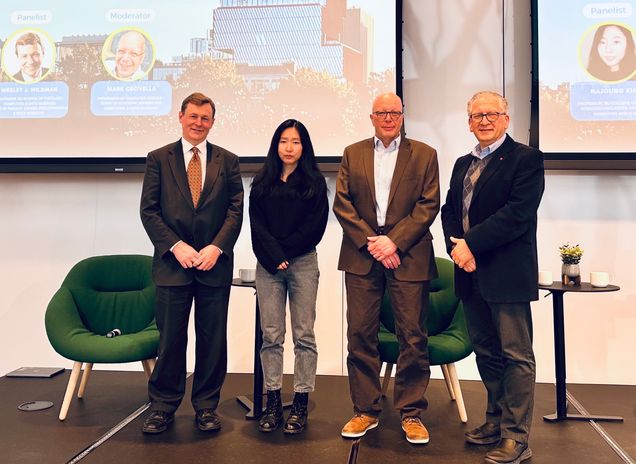Learning to Think after ChatGPT Panel Discussion
What is ChatGPT?
"ChatGPT is a large language model developed by OpenAI, and made available in November 2022, that can understand and generate human-like text responses to various queries and prompts. ChatGPT can perform a wide range of natural language processing tasks, such as language translation, question answering, summarization, and conversation generation. It is used in various applications, including chatbots, virtual assistants, and customer support systems," courtesy of ChatGPT.
###
Leading the Way and Defining Policy
Following a tidal wave of media coverage on ChatGPT earlier this year, Professor Wesley Wildman engaged his Data, Society and Ethics (CDS DS 380) class in deep discussion and debate on the ethics of the large language model. Wildman opened the January 23 class with two powerful questions: “Is ChatGPT use a form of cheating and how do we define it?” For the first half of the class, the "ban, keep, or modify" conversation ensued.
Students then moved to breakout sessions and were tasked with creating parameters for academic use in the classroom. Several class discussions and iterations later, a blueprint for ChatGPT use (and similar artificial intelligence models) was created and the policy, called the Generative AI Assistance (GAIA), was unanimously adopted by the DS 380 classroom.
"The challenge was to generate a well-reasoned policy to be implemented in grading, a policy that takes account of the goals of university education and is responsive to numerous stakeholder perspectives,” Wildman said. "And we did just that."
Read the Why ChatGPT Is Both Exciting and Unsettling for Students, Faculty in BU Today and access the BU Faculty of Computing & Data Sciences Policy on the Use of AI Text Generation: Generative AI Assistance (GAIA) Policy.
From the Classroom to the Town Square
In response to the creation and adoption of the GAIA policy coupled with the need to bring attention to some of the issues surrounding generative AI tools – including its anticipated influence on teaching, learning, and pedagogy – CDS hosted its inaugural panel discussion on “Learning to Think after ChatGPT," on February 23 in the CDS Conference Center. More than 120 BU faculty, students, and staff attended the one-hour+ inaugural event.
"Beyond our panelists' amazing job, the one thing that struck me that night was the extent to which students engaged in the discussion that ensued, and also the nature of the questions they posed," said Azer Bestavros, CDS Associate Provost. "To me, it reflected their eagerness and expectation that their education at BU will allow them to domesticate generative AI as opposed to being threatened by it."
Watch the "Learning to Think after ChatGPT" video and view event presentations and the Q&A session.
About the Panelists, Moderator, and Welcome Address:

Wesley J. Wildman: Professor, BU School of Theology, Computing & Data Sciences; Chair of Faculty Affairs for Computing & Data Sciences
Prof. Wildman is a computational social scientist and ethicist who teaches ethical and responsible computing in the Faculty of Computing and Data Sciences.
Najoung Kim: Professor, BU College of Arts & Sciences Linguistics and CAS Computer Science
Prof. Kim studies computational semantics/pragmatics and generalization in humans and machine learning models, using computational and experimental linguistic methodologies.
Mark Crovella: Professor, Computer Science and Computing & Data Sciences; Chair of Academic Affairs for Computing & Data Sciences.
Prof. Crovella does research in data science methods, applications of data science to biological and social problems, and the social impacts of data science.
Azer Bestavros: Warren Distinguished Professor of Computer Science + Associate Provost for Computing & Data Sciences.
